HP Chromebook 11 Review
by Anand Lal Shimpi on October 15, 2013 2:45 AM EST- Posted in
- Laptops
- HP
- Chrome OS
- Chromebook
Battery Life & Charging
Chrome OS has never struck me as being particularly optimized for low power consumption. Despite using relatively power efficient hardware and being paired with a 30Wh internal battery, the Chromebook 11 barely lasted 5.4 hours in our web browsing battery life test. Local video playback was even worse at 4.8 hours.
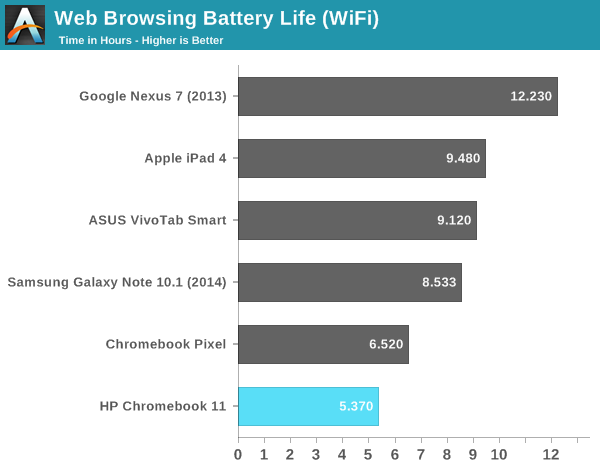
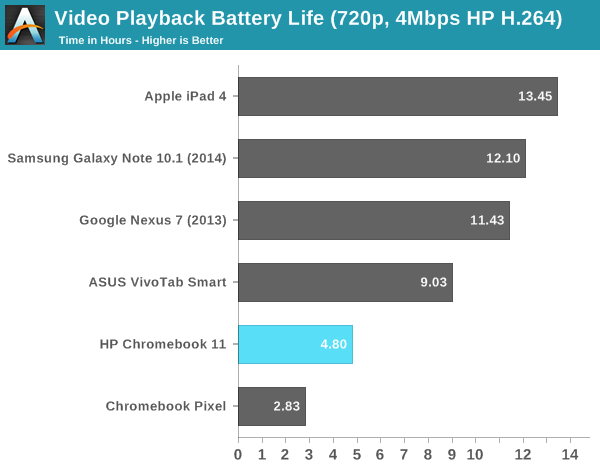
Under heavy multitasking scenarios I wouldn’t be surprised to see more significant drops in battery life as well.
Charging is the other unique aspect to the Chromebook 11. Rather than a proprietary connector to an AC adapter, the Chromebook 11 features a standard microUSB connector for power. I asked Google if the Chromebook 11 implemented the USB Power Delivery specification, designed to deliver up to 60W over microUSB, unfortunately the answer there was no. There's a 200 kΩ resistor between ground and the ID pin of the Chromebook 11's charger serving as the signal that the charger can pull more current and supply up to 15.75W over the microUSB cable/connector.
You can charge the Chromebook 11 using any microUSB cable + charger combo, although power delivery will be limited to whatever the charger supports. You’ll also get a warning under Chrome OS:
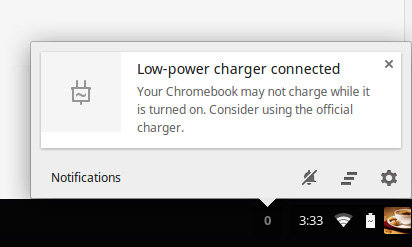
Similarly, the Chromebook 11’s charger can be used to charge other microUSB devices but only at the maximum rate supported by the device.
When connected to the Chromebook 11, the bundled charger quickly ramps up to 3A @ 5.25V after a brief period, presumably where it confirms that the attached device is capable of handling increased current delivery.
Charge time is incredibly quick thanks to the 15.75W charger. The adapter draws a maximum of 21W at the wall (just under 80% efficiency, no 80Plus certification here it seems) and can completely charge the Chromebook 11 in roughly 2.5 hours.


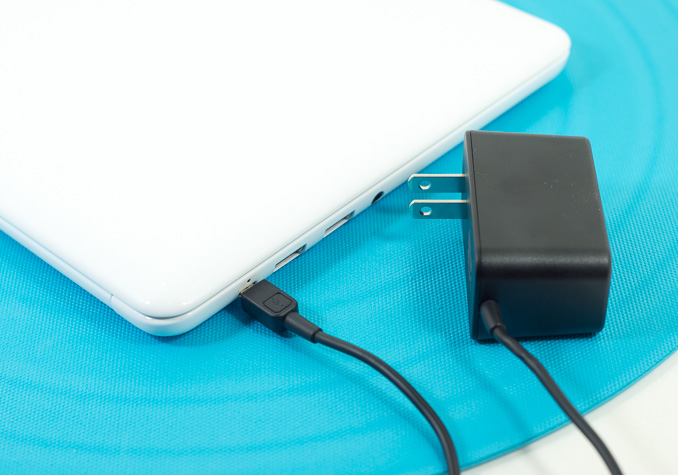
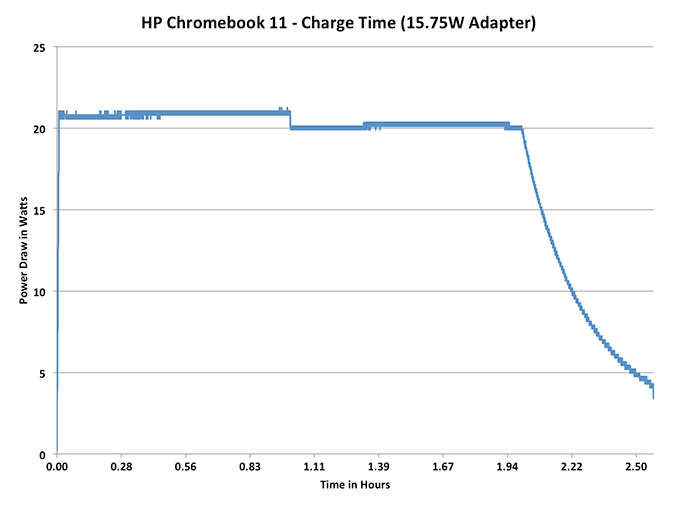








90 Comments
View All Comments
kyuu - Tuesday, October 15, 2013 - link
The storage is eMMC, which is not the same thing as an SSD. eMMC storage is really dirt cheap so adding an extra 16GB would not drive the cost up more than a few dollars.errorr - Tuesday, October 15, 2013 - link
iSupply has the cost of 16GB v. 32GB eMMC as about a $9.00 difference. I imagine that to maintain good margins that would put it in the $299 range which from a psychological perspective is a significant increase. I read a study that said that prices ending in 79 seem lower than the actual difference would suggest in a rational market.EastVillageIdiot - Tuesday, October 15, 2013 - link
Did you even read the review? Have you used this laptop that you claim has a "crappy" keyboard? Anand described the keyboard as excellent, in the same class as the Macbook Air. It's the same size as a MB Air, it weights 2.3 lbs, and it boots up in just a few seconds. Lots of users can live without 1080p YouTube streams, and lots of people are going to buy this and be pretty happy with it.Also, Anand tested the battery life at between 4.8 and 5.37 hours, so you round DOWN to 4? Who is really the fanboy with an agenda?
What a joke of a comment.
Spunjji - Tuesday, October 15, 2013 - link
You quite clearly didn't actually read the review. That, or your reading comprehension is not up to par.Braumin - Tuesday, October 15, 2013 - link
ChromeOS is getting far more press than it's deserved.This thing sounds like a piece of crap and yet, not only is it reviewed, it's reviewed favorably.
1. Gets hot
2. Slow
3. Terrible battery life
4. No multitasking
5. No offline apps (basically)
6. No storage
The positives are decent (but not good) screen, keyboard is OK, and the price is low.
Why would anyone buy this again?
For $300 you'll be able to get a Venue Pro 8 with Bay Trail, active stylus, Windows 8.1, far better battery life, and a real OS. Plug it into a monitor and keyboard if required for a full PC experience.
I get Android. Why is Google also pursuing ChromeOS?
kyuu - Tuesday, October 15, 2013 - link
Yeah I'm not sure why they're pushing ChromeOS when they already have Android. Why not just make an Android skin suited for laptop usage?Jaybus - Tuesday, October 15, 2013 - link
Because Android, like iOS, is not suitable for laptops. Also, ChromeOS is completely geared toward cloud aps and cloud storage, basically a machine dedicated to being a browser. Google wants to make money off of the cloud services, not the sales of Chromebooks. They make nothing on the Chromebook itself.Braumin - Tuesday, October 15, 2013 - link
And neither will HP so once again I don't see the point of this device, nor the amazing amount of press it has received.Does Android not have a browser? Isn't it Chrome?
ChromeOS is also not suitable for laptops.
nikon133 - Tuesday, October 15, 2013 - link
Hum. From my experience with Android tablet, I'd say it is much more suitable for netbook form factor than CromeOS is. From my perspective, CromeOS is like Android with almost everything (beside browser) removed/disabled. How is that more suitable for traditional laptop form factor?I understand what Google wants to achieve here - tie users into Google cloud services - but it just isn't my cup of tea. Nor is it for pretty much anyone else I know. Saying that it is niche, in it's current state, sounds like huge overstatement.
Samus - Wednesday, October 16, 2013 - link
OneOfTheseDays--Did you even read the review?